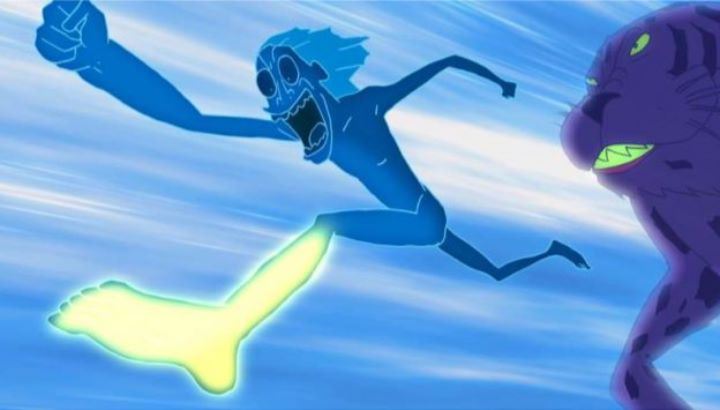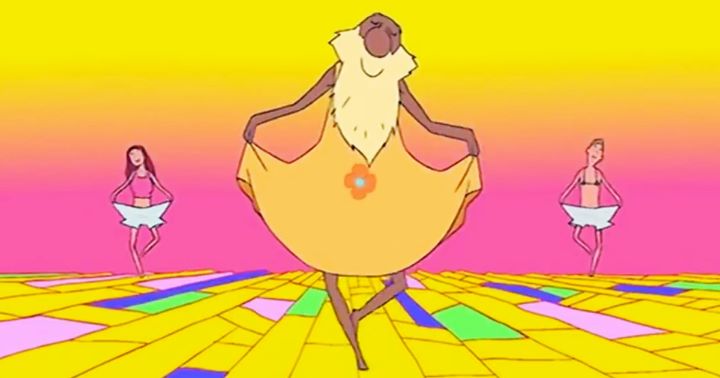










The 2004 film "Mind Game" has a fascinating history regarding it's existance AFTER its release, rather than regarding the making of it. It was animated by Studio 4C, an anime studio that was reaching its peak in 2004, and to which this film helped forever define its style and reputation in unorthadox character designs and high-caliber animation (its next feature film "Tekkonkinkreet" in 2006 is the only other film I can think of that looks remotely similar to "Mind Game"). This was also the directorial debut for Masaaki Yuasa, and similarly it helped cement himself as a unique visionary that would continue to find work in anime, slowly growing a fanbase behind him. And yet, "Mind Game" never officially released in English in North America (only Austrailia received a English release). Rumors around the time were that the studio saw that the film was heavily pirated online, and that this would reduce any chance in the film making a profit on home video. Which is a common misconception... most viewers who intend to pirate and never pay for a film were unlikely to take a chance in purchasing anyway, and in this case, piracy likely came out of impatient curiousity, and the cult following around the indie hit suggests that seeing the film ahead of time would only have increased success through word-of-mouth. But as such, the only way to view the film for over a decade was to watch an English-subtitled rip online, which were of high quality and easy to find.However, a region-free international Bluray and DVD edition was released in 2017, thanks to UK distributor Anime Limited and its successful Kickstarter campaign. The campaign itself was a strange one, as it only asked for a mere 4,500 pounds (approximately $6,000 USD) to print the Bluray set. I know some fans who would cough up the entire sum themselves if they had to for this cause. It was as if they were afraid of failing, or were planning to proceed regardless and wanted to use this to guess how many to print. Naturally, the crowdfunding campaign succeeded within days, but even then raised a relatively small amount from a little over 700 backers, a result perhaps of not preparing to provide further inticements beyond a copy of the discs. This is the set I received, and remains a limited-run print available only online. A year later, American distributor GKIDS confirmed they too would release a proper home-video Bluray in 2018, a set I would have preferred to own instead, but I still believe I did the right thing in taking a chance given that no release was certain for so long. Even after these releases, the film remains at best a "cult classic" as in only a small subset of the anime community will have likely ever heard of it, let alone have seen it. While it is best that the film be available to as wide an audience as possible, it's understandable why it didn't become a global runnaway success. "Mind Game" is very much a "indie-style" film, based on a lesser known comic of the same name by Robin Nishi (coincidently, the main character of the film is also a manga-creator named Nishi). It has subtle themes about the human condition, but is told through such a chaotic and diverse series of scenes and styles that it is impossible to walk into the film knowing what to expect. This will split some audiences, that much is unavoidable. But this would easily make it a standout at any film festival where it best feels at home. If you are in the right state of "mind" to watch "Mind Game," you too will be blown away.Nishi is a manga creator with bad luck, never having admitted his love for his school crush Myon, and learning she (now "just" a friend) is getting married. While meeting her husband over ramen and controlling his conflicting emotions, a out-of-control sports star and his Yakuza keeper make a scene theatening to hurt the group and rape Myon. Before being able to do something, Nishi literally gets "a cap in his ass" and dies. This is when he meets one of the best depictions of God I've ever seen, this scene alone could have made an award-winning short. Refusing this humiliating death, Nishi escapes death and God (reluctantly) puts him seconds back before his death, to which he takes advantage of the moment and escapes, taking Myon and her older sister (owner of the diner) on a wild chase with a new lease on life. Things get out of hand, and then to a sudden halt, when the three are swallowed by a whale and forced to reconsider their outlook on life.  Most of the film takes place inside the whale, a dark and damp place compared to the neon-blue city they left behind. Other than the old man they find there ("I've been trapped here for over 30 years" he says much to the group's dismay) and the assorted swallowed trash that makes up the old man's home. Through talking, they slowly accept their fate, and even begin to accept the whale as home, knowing they at least have each other to pass the time, before culminating in a last-chance attack to escape the whale once and for all. So yes, there are exciting moments in the film, mainly in the Yakuza attack and chase at the start, some energetic montages in the whale, and a rowing/running race that spans several minutes to escape through the whale's mouth. These are exciting and perhaps similar to experiencing an acid trip on screen (it is called "Mind Game" after all, so it should have such content). Else, the film is much more quiet and personal, giving time to understand the characters, their pasts, and their hopes for the future. The scenes jump back and forth between past, present, and a series of potential but unconfirmed futures, all highlighting the hopes of what becomes of these characters and the human race. Images are worth a thousand words, and the film expertly provides this exposition almost entirely through images. Which is not to put down the acting: the dialogue that does exist is fast and witty, and the actors handle it with aplomb, making the characters feel real. The music relies on some tracks being reused a tad too often, but said tracks are more memorable than most productions.Speaking of subtlety, I'm pretty certain the old man is homosexual, but the film handles this with the utmost respect, not spelling out anything and only hinting through a handful of cute scenes that he might be in love with lead character Nishi. Sexualiyu in general is present, but handled maturely and with grace. It feels natural, a part of the human existance.The animation isn't quite up to Studio 4C's high standards; both before and after "Mind Game," they've produced superior animation. But it successfully (if barely) manages to keep up with the visuals, which range from live-action stop-moition, grounded but unique design, and cartoonish carefree caricatures. Few other examples exist where the visual style of a story is swapped so quickly or with such range. It results in a few incredible scenes, although I hesitate to say the designs are pretty to look at amongst all this variety. But it is precisely this variety in the animation and story, whiplashing from high to low, that makes the film as a whole so memorable. Few manage to tell a story that feels so personal and hopeful for the future. "Mind Game" doesn't really have an ending, its final scenes a quick montage of ambiguous suggestions of what happens or what may come. This feels appropriate. "Mind Game" at is core is the story of you, me, our friends and family, our neighbors and coworkers, that little girl you passed by last week and that coffee-brewer in Mississippi you never met. The story isn't over yet.
Most of the film takes place inside the whale, a dark and damp place compared to the neon-blue city they left behind. Other than the old man they find there ("I've been trapped here for over 30 years" he says much to the group's dismay) and the assorted swallowed trash that makes up the old man's home. Through talking, they slowly accept their fate, and even begin to accept the whale as home, knowing they at least have each other to pass the time, before culminating in a last-chance attack to escape the whale once and for all. So yes, there are exciting moments in the film, mainly in the Yakuza attack and chase at the start, some energetic montages in the whale, and a rowing/running race that spans several minutes to escape through the whale's mouth. These are exciting and perhaps similar to experiencing an acid trip on screen (it is called "Mind Game" after all, so it should have such content). Else, the film is much more quiet and personal, giving time to understand the characters, their pasts, and their hopes for the future. The scenes jump back and forth between past, present, and a series of potential but unconfirmed futures, all highlighting the hopes of what becomes of these characters and the human race. Images are worth a thousand words, and the film expertly provides this exposition almost entirely through images. Which is not to put down the acting: the dialogue that does exist is fast and witty, and the actors handle it with aplomb, making the characters feel real. The music relies on some tracks being reused a tad too often, but said tracks are more memorable than most productions.Speaking of subtlety, I'm pretty certain the old man is homosexual, but the film handles this with the utmost respect, not spelling out anything and only hinting through a handful of cute scenes that he might be in love with lead character Nishi. Sexualiyu in general is present, but handled maturely and with grace. It feels natural, a part of the human existance.The animation isn't quite up to Studio 4C's high standards; both before and after "Mind Game," they've produced superior animation. But it successfully (if barely) manages to keep up with the visuals, which range from live-action stop-moition, grounded but unique design, and cartoonish carefree caricatures. Few other examples exist where the visual style of a story is swapped so quickly or with such range. It results in a few incredible scenes, although I hesitate to say the designs are pretty to look at amongst all this variety. But it is precisely this variety in the animation and story, whiplashing from high to low, that makes the film as a whole so memorable. Few manage to tell a story that feels so personal and hopeful for the future. "Mind Game" doesn't really have an ending, its final scenes a quick montage of ambiguous suggestions of what happens or what may come. This feels appropriate. "Mind Game" at is core is the story of you, me, our friends and family, our neighbors and coworkers, that little girl you passed by last week and that coffee-brewer in Mississippi you never met. The story isn't over yet.